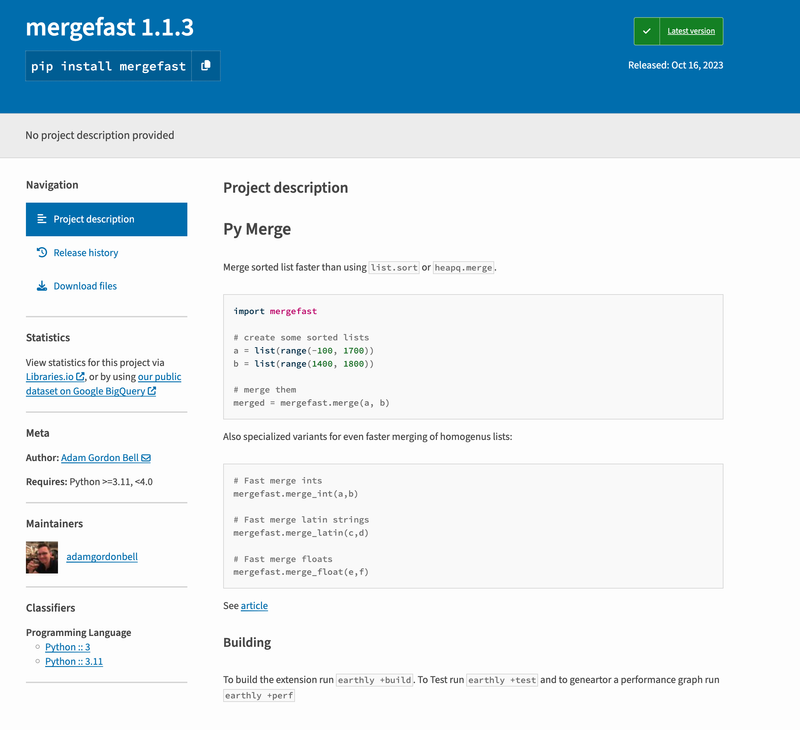Python C Extension pypi Package
In this Series
Table of Contents
In Article 1 of this series, I showed you how to package and distribute pure Python code using setuptools and a setup.py file. Then in Article 2, we looked at how the Poetry tool simplifies this process for pure Python packages. In this final article, we’ll tackle distributing a Python package containing a C extension, which adds some extra complexity.
Why a C Extension
In the previous articles we published mergefast and I claimed the Python code shown was a performant merging algorithm. That was a fib - the pure Python implementation is actually slower then just resorting the list. ( Background. )
I did this to set up the need for a C extension. To make mergefast fast, we need to write it as a c extension, which significantly complicates publishing. But now we are ready to tackle publishing a C extension to PyPi.
Let’s get started…
The Code
To start, let’s look at the code we want to package up. In the previous articles we had some Python code that looked like:
def merge(list1, list2):
# standard merge sorted lists with pop algoBy implementing this in C, we can achieve much faster performance than in Python. But, the specifics of the C porting aren’t the point today. The packaging is.
To integrate this C extension into Python, we need a header file.
PyObject* merge( PyObject*, PyObject* );We also need a bind.c, where there are a lot of little details to get right. Lets go slowly through them, as this is where I initially got stuck.
1. Declaring Our PyMethodDef Function
#include "core.h"
PyMethodDef merge_funcs[] = {
{
"merge", /* function name */
(PyCFunction)merge,
METH_VARARGS,
"merge two sorted lists" /* function docs */
},
{ NULL }
};- We declare an array of
PyMethodDefstructures namedmerge_funcs. - Each
PyMethodDefstructure represents a method that will be made available in our Python module. We just have one for now. - The structure has the following elements:
"merge": The name of the function as it will appear in Python.(PyCFunction)merge: The actual C function that implements this method.METH_VARARGS: A flag indicating the calling convention of our function."merge two sorted lists": A documentation string for the function.
- The
{ NULL }entry serves as a sentinel, signaling the end of the method definitions.
2. Defining Our Module
PyModuleDef merge_mod = {
PyModuleDef_HEAD_INIT,
"core", /* library name */
"core module", /* module docs */
-1,
merge_funcs,
NULL,
NULL,
NULL,
NULL
};- Next we define a module (
PyModuleDef) structure namedmerge_modrepresenting the module we are creating. PyModuleDef_HEAD_INIT: A required boilerplate initialization."core": The name of our module."core module": A documentation string for our module.-1: Refers to the size of the module state in bytes, with-1indicating module-level state only.merge_funcs: The previously defined array of methods.
Everything, after that is optional, so we pass NULL for now.
3. Defining Our Init Function
PyMODINIT_FUNC PyInit_core( void )
{
return PyModule_Create( &merge_mod );
}Next up is Init. And guess what, it initializes our module.
PyMODINIT_FUNCis a macro that ensures that the function has the correct return type and visibility to be used as a module initialization function.PyInit_core: The name is significant. If our module is named “X”, then the initialization function must be namedPyInit_X.
Python calls this when the module is imported. We then use PyModule_Create to create and return a new module object based on our merge_mod definition above.
C Extension Building With SetupTools
Now we are ready to build our extension. Even though we are using poetry, which has a nice built in build and publish functionality, I found using setup tools directly with a setup.py the easiet way to build.
( It’s possible to configure some of setuptools via pyproject.toml, but it’s tricky and beyond our scope here. )
So, create a setup.py:
from setuptools import setup, Extension, find_packages
merge_module = Extension(
"mergefast.core",
sources=["mergefast/bind.c", "mergefast/core.c"],
include_dirs=["mergefast"],
extra_compile_args=["-O3"]
)"mergefast.core":This is the name of the extension module we are building.
mergefast.corewill be a submodule ofmergefast.sources=["mergefast/bind.c", "mergefast/core.c"]:
These are the source files that need to be compiled to produce or extension.
include_dirs=["mergefast"]:This specifies directories where the compiler should look for header files during the compilation process. Without this
core.hwon’t be found.extra_compile_args=["-O3"]:Here we are just using the
-O3flag to apply high-level optimizations to improve performance. We are aiming for maximum execution speed.
Next, we call setup():
setup(
name="mergefast",
version="1.1.3",
packages=find_packages(),
ext_modules=[merge_module],
)Most of this is straight-forward. The first two lines, we are naming our package and versioning it. ext_modules=[merge_module] tells setuptools to compiler our mergefast.core package previously defined.
The third line, packages=find_packages(), is a bit trickier. The find_packages() function is a utility from setuptools that automatically discovers all Python packages in your project directory. This is essential for getting our __init__.py file into the final package.
Our __init__.py imports core, so import mergefast.merge works and without find_packages() it won’t be included in our package.
from mergefast.core import merge_int, merge_float, merge_latin, mergeWithout that, our package will work fine locally as a project location based package in poetry, but import mergefast won’t work when install as a package.
( Highlighting the value of testing the package installation process. )
Build and Test in Place
With that setup.py setuptools code in place, we can compile and test our solution.
> poetry install
Installing dependencies from lock file
...
> poetry shell
Creating virtualenv mergefast-95GN-TFI-py3.11 in /Users/adam/Library/Caches/pypoetry/virtualenvs
Spawning shell within /Users/adam/Library/Caches/pypoetry/virtualenvs/mergefast-95GN-TFI-py3.11
Traceback (most recent call last):
File "/Users/adam/sandbox/mergefast/mergefast/tests/test.py", line 1, in <module>
import mergefast
File "/Users/adam/sandbox/mergefast/mergefast/mergefast/__init__.py", line 1, in <module>
from mergefast.core import merge_int, merge_float, merge_latin, merge
ModuleNotFoundError: No module named 'mergefast.core'Oh no. More work to do. You see we have our mergefast package, but we need to compile our core module.
> python setup.py build_ext --inplace
python setup.py build_ext --inplace
running build_ext
building 'mergefast.core' extension
creating build
creating build/temp.macosx-13-arm64-cpython-311
creating build/temp.macosx-13-arm64-cpython-311/mergefast
clang -Wsign-compare -Wunreachable-code -fno-common -dynamic -DNDEBUG -g -fwrapv -O3 -Wall -isysroot /Library/Developer/CommandLineTools/SDKs/MacOSX13.sdk -Imergefast -I/Users/adam/Library/Caches/pypoetry/virtualenvs/mergefast-95GN-TFI-py3.11/include -I/opt/homebrew/opt/python@3.11/Frameworks/Python.framework/Versions/3.11/include/python3.11 -c mergefast/bind.c -o build/temp.macosx-13-arm64-cpython-311/mergefast/bind.o -O3
clang -Wsign-compare -Wunreachable-code -fno-common -dynamic -DNDEBUG -g -fwrapv -O3 -Wall -isysroot /Library/Developer/CommandLineTools/SDKs/MacOSX13.sdk -Imergefast -I/Users/adam/Library/Caches/pypoetry/virtualenvs/mergefast-95GN-TFI-py3.11/include -I/opt/homebrew/opt/python@3.11/Frameworks/Python.framework/Versions/3.11/include/python3.11 -c mergefast/core.c -o build/temp.macosx-13-arm64-cpython-311/mergefast/core.o -O3
creating build/lib.macosx-13-arm64-cpython-311
creating build/lib.macosx-13-arm64-cpython-311/mergefast
clang -bundle -undefined dynamic_lookup -isysroot /Library/Developer/CommandLineTools/SDKs/MacOSX13.sdk build/temp.macosx-13-arm64-cpython-311/mergefast/bind.o build/temp.macosx-13-arm64-cpython-311/mergefast/core.o -o build/lib.macosx-13-arm64-cpython-311/mergefast/core.cpython-311-darwin.so
copying build/lib.macosx-13-arm64-cpython-311/mergefast/core.cpython-311-darwin.so -> mergefastAnd then we test run our c based merge
python tests/test.py
timsort took 2.2706818750011735 seconds
merge took 2.0606187919911463 secondsAnd we are faster then timsort!
Binary Package Woes
It’s worth noting the above build produces core.cpython-311-darwin.so on my M1 mac. It will produce something different if you are on windows or linux and this adds challenges when it becomes time to produce our .whl.
> python setup.py bdist_wheel
running bdist_wheel
running build
running build_py
...
creating 'dist/mergefast-1.1.3-cp311-cp311-macosx_13_0_arm64.whl'The created wheel file is mergefast-1.1.3-cp311-cp311-macosx_13_0_arm64.whl
Because the c extension functionality is closely tied to the python version, this shared object file is just for 3.11 cp311-cp311. And because this wheel contains native code, its specific to the OS and architecture its compiled for (macosx_13 and arm64).
Want to pip install from PyPi on different systems, like not arm64 or not macOS x? Good news: You just have to build a wheel for each system and then upload them all. But, there’s a catch. Even with things like manylinux, you’ll need the right machines. Virtual or real ones with the systems you’re building for.
Many use GitHub actions matrix builds to accomplish this:
build_wheels:
name: Build wheels on $ - $
runs-on: $
strategy:
fail-fast: false
matrix:
include:
- vers: i686
os: ubuntu-20.04
- vers: aarch64
os: ubuntu-20.04
- vers: auto64
os: ubuntu-20.04
- vers: arm64
os: macos-10.15
- vers: auto64
os: macos-10.15
- vers: auto64
os: windows-2019Let’s skip all that for now, though, by doing a source build.
Source Build to the Rescue
When you use pip install, pip picks the best format for your package. It likes wheels because they often have pre-compiled code. This makes installation faster and skips the build step.
If pip can’t find a wheel, it uses the source distribution and compiles during installation.
The downside? The user needs a C compiler. But, as long as you have the python.h header file, that’s the only constraint for our small extension. No need for a complex matrix build. Let’s proceed with that approach.
> python3 setup.py sdist
...
producing mergefast-1.1.3.tar.gzWe can test this package with a pip install dist/mergefast-1.1.3.tar.gz. I, of course, do this Earthly, for reproducibility sake:
test-dist-install:
FROM python:3.11-buster
COPY +build/dist dist
ENV TARFILE=$(ls ./dist/*.tar.gz)
RUN pip install "$TARFILE"
COPY tests .
RUN python test.pyWhich gives:
> pip install dist/mergefast-1.1.3.tar.gz
Building wheel for mergefast (pyproject.toml) did not run successfully.
│ exit code: 1
╰─> [21 lines of output]
running bdist_wheel
...
gcc -pthread -Wsign-compare -DNDEBUG -g -fwrapv -O3 -Wall -fPIC -Imergefast -I/usr/local/include/python3.11 -c mergefast/bind.c -o build/temp.linux-x86_64-cpython-311/mergefast/bind.o -O3
mergefast/bind.c:1:10: fatal error: core.h: No such file or directory
#include "core.h"Failure! You can see that on installation pip runs the bdist_wheel process which works ok, until we try to include our header file core.h.
MANIFEST.in
You see, the python sdist process knows to include all the python files in a package into the source distribution. However, when it comes to additional source files like our C header and source files, setuptools needs a bit of help. It has no way of knowing what extra non-Python files are required for compilation.
To address this, setuptools allows us to provide a manifest file that explicitly specifies any additional files our package needs included. This MANIFEST.in file gives us fine-grained control to declare all the files required for a complete source distribution. While an extra step, it’s crucial for ensuring our C extension can be properly built when installed from source.
So before we can distribute our package, we need to create a MANIFEST.in to inform setuptools of our C source files. With this manifest, we can ensure pip has everything it needs to build our extension from source.
include mergefast/*.c
include mergefast/*.h
include mergefast/*.pyWith that in place, installing from a source distribution works:
> earthly +test-dist-install
...
+test-dist-install | --> RUN python test.py
+test-dist-install | timsort took 5.315027578999434 seconds
+test-dist-install | merge_int took 1.7830523350021394 seconds
+test-dist-install | merge took 4.74845955499768 secondsNow all I need to do is publish:
> poetry publish -n
Publishing mergefast (1.1.3) to pypi
- Uploading mergefast-1.1.3.tar.gz 100%And just like that we have our package on PyPi:
If you’d like to see how to test the package before pushing see the earlier article on TestPyPi.
Conclusion
In this final article, we saw how packaging a C extension requires extra configuration compared to pure Python. All the code for mergefast, and its earlier python implementation mergeslow are up on github.
Of course, I have wrapped all these stages of building, local package installing, pushing to TestPyPi and pushing to actual PyPi in Earthfile targets. That way I don’t need to head back to this tutorial each time to remember how to run each step.
I hope this three part series is useful. This last stage, the python extension packaging was the most involved, but with the necessary background it all makes sense.
It goes to show that behind the ease of pip install there is lots of unsexy but needed packaging, building and distribution work happening.
( Take a look at the pip packaging code for a lib like TensorFlow sometime to see how complex things can get. )
And if you want to know about the next article in the series, subscribe to the newsletter. I’m probably going to attempt a python extension in Rust soon.
Earthly Lunar: Monitoring for your SDLC
Achieve Engineering Excellence with universal SDLC monitoring that works with every tech stack, microservice, and CI pipeline.




